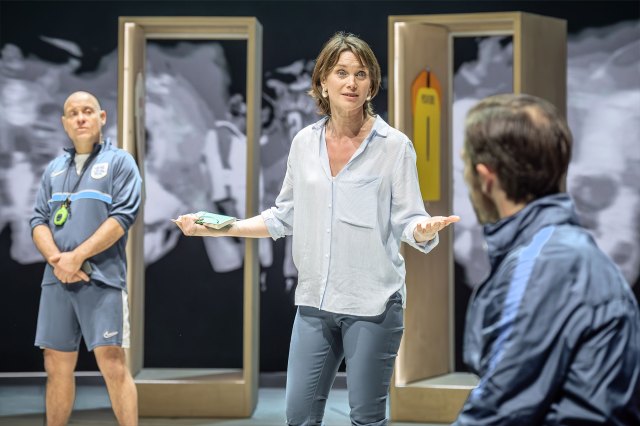Dear England review – revised play covers 2024 Euros plus Southgate’s retirement and still hits the back of the net
James Graham’s updated version of his Olivier Award-winning play is also set for a regional premiere at the Lowry in Salford and a national tour

On the night this great drama about England, its view of itself and how that is refracted through football re-opened at the National Theatre, the former England football manager Gareth Southgate gave a speech. In the course of the Richard Dimbleby lecture, he spoke out about his concerns for a generation of suffering young men, suggesting that “callous, manipulative and toxic influencers” are taking the place of traditional father figures in society.
The speech could not have been more topical or pointed more acutely to the purpose of James Graham’s magnificent and important play. In his time in charge of the England men’s football team from 2016 to 2024, Southgate became a surrogate father, a mentor to the nation, offering a way of being a man and a sporting hero that incorporated kindness, thoughtfulness and solidarity.
But what’s wonderful about Dear England, is that it presents Southgate’s attempts to introduce a less divisive culture into football, in ways that are stunningly theatrical and hugely enjoyable. The travails of the English team may be used to stand as a metaphor for England’s own attempts to define itself and its future, but dramatically, it is as thrilling and nail-biting as a penalty shoot-out.
Graham’s themes and concerns as he traces the story of Southgate’s eight years in charge, find perfect expression in Rupert Goold’s superb direction, which perfectly holds the balance between movement and stillness, filling Es Devlin’s stylised set with an ever-changing kaleidoscope of action.
Ellen Kane and Hannes Langolf’s movement direction sets the young actors who embody the team, and a surrounding cast of ever-changing characters, jumping, running and swerving across the Olivier’s great open spaces. But Goold’s control also allows for the place to fall silent and thought to sink in: it’s not just the moment when England overcomes its fear of the penalty that is gripping, but also the tensions that build as Southgate attempts to assert his much-resisted philosophy.
At one point, Gwilym Lee’s tightly wired Southgate pushes back against the notion that he is doing something radical. “It’s just be kind to people, care about them,” he says. “That’s radical in sport,” his colleague shoots back.

The play premiered in June 2023, not long after England had been knocked out of the Qatar World Cup after Harry Kane (wonderfully embodied here as a gentle hero by Ryan Whittle) had missed a penalty in the quarter-final against France. Graham has cut, rewritten and reshaped its second act, to incorporate the team’s subsequent defeat in the finals of the 2024 Euros and Southgate’s retirement.
It’s still not perfect. The second act is too sketchy and still does not lend enough weight to the ferocious racism unleashed by the penalty misses of Marcus Rashford, Jadon Sancho, and Bukayo Saka in the 2020 Euros final, events that revealed exactly the kind of toxicity Southgate was fighting against.
Yet the sheer energy of both the writing and the production carries it through. Seeing it again (with Elin Schofield as revival director), you notice how many different ways Goold and Graham find to build excitement around staging football tournaments, and how every effect from Jon Clark’s lighting to Ash J Woodward’s nostalgic black and white videos, to Dan Balfour and Tom Gibbons’ raucous sound design, contributes to the team effort of scoring a hit.
The cast is on form too, with actors such as John Hodgkinson and Gunnar Cauthery returning to their beautifully timed impersonations of characters such as FA chairman Greg Clark and an eager Gary Lineker. As Pippa Grange, the one significant female figure in the cast, Liz White brings calm and warmth to a one-note role of consistent wisdom.
Lee has huge shoes to fill – not just Southgate’s but also those of Joseph Fiennes, who made the part his own. He is perhaps less funny than Fiennes but pays full and careful honour to Southgate’s intonation and his essential goodness. It is a winning performance in a play that is vital in every way – both full of life, and of essential debate. It’s excellent to have it back.
Dear England continues its run at the National Theatre until 24 May, then moves on to the Lowry, Salford from 29 May to 29 June, and then embarks on a nationwide tour from September 15.




















